
|
Deaths Scenes 1915-1929 |

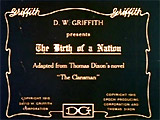
|
In a tense sequence, 'Little Sister' Flora (Mae Marsh) was spoken to by emancipated former house servant/slave - the inflamed, lusty Negro "renegade" Gus (Walter Long). He confronted her with the news that he was now a distinguished military officer and ready for marriage. When he took her hand as a gesture, she slapped him, jumped over a log, and ran off. He pursued her after the rejection and chased her through a sun-splattered pine-forested area. As he ran after her, Gus reassured Flora: "Wait, missie, I won't hurt yeh." After a long and exciting pursuit sequence, Flora scrambled higher and higher up a rocky cliff. As Gus approached closer toward her and gestured for her to come down, she turned and repeatedly threatened him: "Stay away or I'll jump." With arms outstretched, Flora appeared to lose her balance and she fell off the cliff (or she seemed to have jumped) - viewed from a long shot. At the scene of the fall, a fearful Gus was made an innocent victim - he would undoubtedly be held accountable and punished for her demise.
Also, another impressive death scene was the reenactment of the assassination of President Abraham Lincoln (Joseph Henabery) by John Wilkes Booth (Raoul Walsh) while attending a play. When "a healing time of peace was at hand" came the "fated night of April 14, 1865." A gala performance to celebrate the surrender of Lee was attended by the President and his staff. The young Stonemans were also present. The play was "Our American Cousin," starring Laura Keene. Lincoln was assassinated at Ford's Theatre by John Wilkes Booth, in a meticulously-recreated sequence, another "historical facsimile." Booth lept to the stage, crying "Sic semper tyrannis!" |
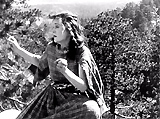 "Stay away or I'll jump." 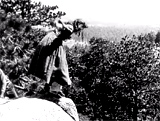 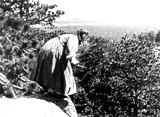 Flora's Jump From Cliff 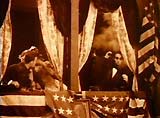 Lincoln's Assassination |
||||||
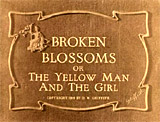
|
In a violent showdown, brutal father Battling Burrows (Donald Crisp) reached for his whip as his daughter, sensitive and frail teenage Cockney waif Lucy Burrows (Lillian Gish) cried: "Don't! Daddy! It wasn't nothin' wrong." The 'closet scene,' the most memorable one in the film, was raw - with virtuoso acting and emotion. Lucy escaped from her father's clutches and hid herself in a small, locked closet in the hovel. It was a claustrophobic, contained and tightly-circumscribed space. As her father threatened: "Open, I tell yer!" she pressed herself against the closet wall in a panic, and gnawed on her own hand like a trapped animal. Clutching her doll for her only comfort, Lucy frantically cried out to her savage father: Don't Daddy! - Don't! THEY'LL HANG YER! As he began to smash down the closet door with an axe, she whirled and spun around and around, pathetically out of control and in a state of suffering terror in her imprisoned space. She began to emit full, open-mouthed, helpless screams. Burrows violated the space and broke through the door, sending wood splinters everywhere. As he ripped through the door to make the opening wider, she crouched down. But he pulled her through the opening, symbolically raping her space by bringing her back into the other room. Burrows threw her on the bed, and then tapped her head with the phallic-like whip handle, a prelude to the final blows that crushed her skull (after the camera iris quickly closed). Lucy was left alone to die on the bed, as Burrows went to another room and began drinking. In her death scene, Lucy succumbed on her pillow while clutching her doll (her link to the Yellow Man) and gave a final finger-smile (her link to her father): Dying, she gives her last little smile to the world that has been so unkind. |
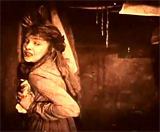 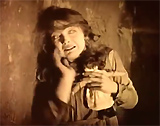 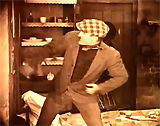 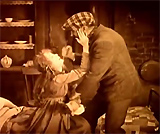 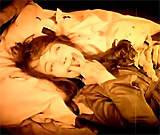 Lucy's Closet Scene |
||||||
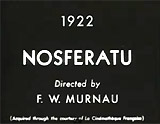 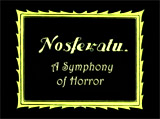
|
Nosferatu (1922, Ger.) Eine Symphonie Des Grauens (aka A Symphony of Terror/Horror) In the concluding death scene, the rat-like vampire Count Orlok (Max Schreck) approached the bedroom of possessed, awaiting female victim Ellen Hutter (Greta Schroder) who had read in his book that
The vampire's shadowy approach came up the stairs and his elongated hand reached out to her bedroom door and toward his stalking subject. She clutched at her left breast in fear and collapsed back onto her bed, as the shadow of Orlok's hand covered her heart when he entered the room. He then began to suck blood from her neck. He was tricked by her into overstaying his welcome when a rooster crowed, signaling dawn and the beginning of daylight. He was exposed to the sun and died in front of her window, grasping his chest, and disappearing in a small wisp of smoke. |
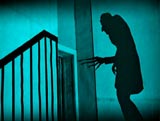 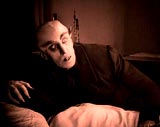 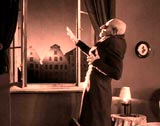 Death by Daylight |
||||||
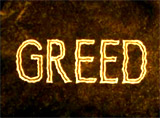
|
This silent classic film ended with the inevitable deaths of two ex-friends, McTeague (Gibson Gowland) and Marcus (Jean Hersholt), under the harsh sun in Death Valley as they greedily fought to the death. In a protracted fight, the two men faced each other and grappled together for the gold as they wrestled for control of the gun. They struggled on the white ground, until McTeague overpowered Marcus and blindly struck with the revolver - he clubbed his one-time friend to death with the gun. On the ground, Marcus lay still and bloody beneath his blows. But in the midst of the life and death struggle, Marcus had found the strength to handcuff their wrists together. McTeague felt a tug on his left wrist - it had become attached to Marcus' right wrist. He turned and looked around - at the canvas bag (with gold coins) on the saddle of the dead mule and at the empty canteen. He sank to his knees and sat in the deadly, pitiless heat of Death Valley, chained and locked to the corpse he just slew. McTeague's last humane act was to release the feeble, half-dead pet bird from its little birdcage/prison. He placed the birdcage on Marcus' stomach, reached into the cage to catch the bird, cradled the little helpless bird in his bloody fingers, kissed it, and then tossed it into the air. It landed dead on the empty canteen. McTeague sat back, gravely acknowledging his own fate. He looked over at the gold coins one more time, as he dazedly awaited death. The camera moved from a medium closeup, to a long shot, and then to an extreme long shot of the lone figure in the middle of the endlessly desolate white landscape. The screen faded to black. |
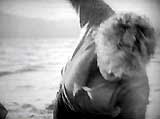  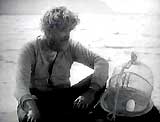 Death in the Desert |
||||||
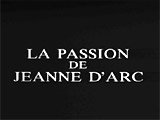
|
The Passion of Joan of Arc (1928, Fr.) (aka La Passion de Jeanne d'Arc) The title character suffered a wrenching burning execution at the stake. It was the martyred death of persecuted Jeanne d'Arc (Maria Falconetti) with her shaved head and a look of forgiveness and pity directed at the gawking onlookers. |
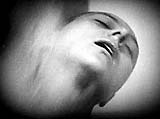 Burned at the Stake |
||||||

|
In a nightmarish scene, naive bride Letty (Lillian Gish) was nearly raped by amoral, married cattle rancher Wirt Roddy (Montagu Love). As he held onto the end of the gun barrel, she shot him at point-blank range into the heart, and he crumpled to the floor, dead but momentarily with his eyes open. This death set up the film's dramatic finale in which she buried him outside in the sand during a windstorm, but then went hysterically insane when she realized that the wind was uncovering evidence of his corpse.
|
 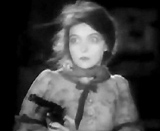 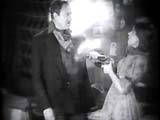 Rape Self-Defense |
||||||
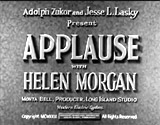
|
Applause (1929) In this film's heartbreaking ending, fading and "washed-up" burlesque star Kitty Darling (Helen Morgan), the ailing, self-sacrificing mother of convent-bred 17 year-old daughter April Darling (Joan Peers), suicidally poisoned herself and slowly died in her dressing room. April vowed to take her mother's place by forcing herself to go out and dance sordid burlesque in front of leering, middle-aged men. She claimed that she would give the crowd their 'money's worth': "I'll show them." She promised her mother:
|
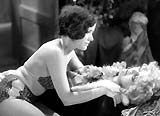 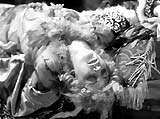 Suicidal Poisoning |
||||||
(chronological by film title) Intro | 1915-1929 | 1930-1933 | 1934-1938 | 1939 | 1940-1942 | 1943-1945 | 1946-1947 | 1948-1949 1950-1952 | 1953-1955 | 1956-1957 | 1958-1959 1960-1961 | 1962-1963 | 1964-1966 | 1967-1968 | 1969-1970 1971 | 1972 | 1973 | 1974 | 1975 | 1976 | 1977-1978 | 1979 1980 | 1981 | 1982 | 1983 | 1984 | 1985 | 1986 | 1987 | 1987 | 1988 | 1989 1990 | 1991 | 1992 | 1993 | 1994 | 1994 | 1995 | 1995 | 1996 | 1997 | 1998 | 1998 | 1999 2000-2001 | 2002 | 2003 | 2004 | 2005 | 2006 | 2007 | 2008 | 2009 | 2010 | 2011 |